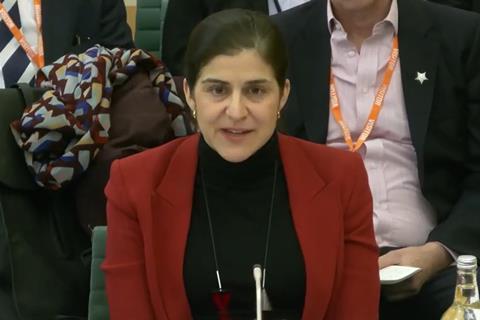Sarah Sackman KC has admitted to MPs that the county court has not recovered from the trauma of the pandemic. Successes such as digitisation of claims are ‘nowhere near enough’

When she appeared before the Commons justice committee this week to answer questions about the county court, Justice minister Sarah Sackman KC (pictured) stressed that she would not sugarcoat her criticism. Sackman euphemistically alluded to ‘challenging areas’, such as the timeliness of resolutions, backlogs, the quality of the court estate and staff recruitment.
But despite her pledge, there remained a sense that Sackman – and indeed senior judges who have also appeared – are detached from the frontline issues that plague court users, and in denial about the extent of the crisis.
The minister aspires to a 30-week turnaround for small claims (the average waiting time is currently more than 50) and a system working as efficiently as interactions between consumers and commercial entities. At the moment, court users would settle for a response to their emails.
Sackman suggested that a county court ‘report card’ would say there is ‘room for improvement’. She cited in particular delays in the south-east, where judges and court staff are harder to recruit and to pin down for any length of time. Wales, which has the best resolution times, has comparatively stable workforces.
‘I would not be doing my job if I sat here and said all is well,’ she said. ‘There are huge challenges. The reality is that the performance of the county court has not truly recovered since the Covid pandemic. We are not where we want to be in terms of timeliness and the modern digitised service which I think we should aspire to deliver.
‘We’ve made big strides. There have been significant successes, not least with the digitisation of online money claims, damages claims, and with the forthcoming plans to digitise possession claims. But it is nowhere near enough.’
Sackman said the correspondence she receives from court users suggests there is ‘frustration’ at service levels. Committee chair Andy Slaughter MP, meanwhile, said lawyers had told him that the service level was much better 20 years ago. Back then county courts had staffed counters to answer queries in person or over the phone.
'There are huge challenges. The reality is that the performance of the county court has not truly recovered since the Covid pandemic. We are not where we want to be in terms of timeliness and the modern digitised service which I think we should aspire to deliver'
Sarah Sackman KC, justice minister
Those days are long gone, with county court communications now funnelled through a centralised call centre in Northampton. Sackman said phones are being answered within three minutes, compared to 40 minutes when calls were directed to individual courts. This came as news to incredulous lawyers posting comments on the Gazette’s website, but HMCTS operations director Daniel Flury stepped in to insist that nostalgia for pre-centralisation was misplaced.
‘They were very unsophisticated telephone systems. There was very little management information, there was very little advanced telephony that told us how many people were waiting and how long they had been waiting for,’ said Flury.
‘I am hoping the court users will recognise this one day: we are seeing, post-centralisation, a vast improvement in our telephones, from call waiting times to abandonment rates.’
The biggest element of county court business is debt recovery. A working group of the Civil Justice Council this week reported that enforcement of judgments is ‘seriously weak’. Most people who responded to the group’s call for evidence said the civil justice enforcement system is performing poorly, and needs to become less complex and more efficient.
Sackman acknowledged the system is not working for individuals and small businesses who cannot face the vagaries of the county court.
She told MPs: ‘There might well be cases that are not even being brought because people think “I just cannot be bothered. I have an enforceable right, I have a valid claim, but because I know I am going to have to enter a system which is still in part paper-based, it’s going to take the best part of a year and a half, it’s not worth my while, I’ll take the hit and move on”.’
Speaking of judges, she added: ‘They too [are concerned about] the conditions they are working in, buildings which are often in poor condition, while also dealing with the challenges of a largely paper-based system which has inefficiencies in it. All of that can be demoralising.’
Everybody knows the biggest solution is investment. But there is no indication that the Treasury will bend – particularly given that the recently concluded courts IT programme burned through £1.4bn in achieving barely a quarter of its targets.
Sackman revealed that the Ministry of Justice has requested £6m-£8m for digitising defences made in the county court. There is no guarantee even such relatively meagre funds will be made available in this year’s spending review.
This article is now closed for comment.




































7 Readers' comments